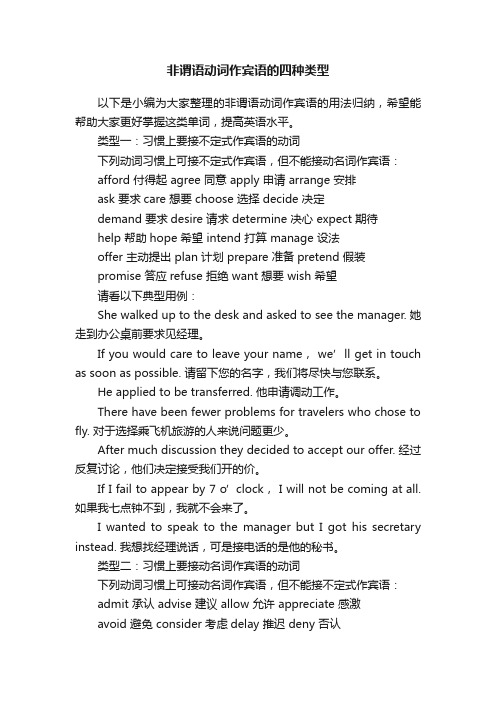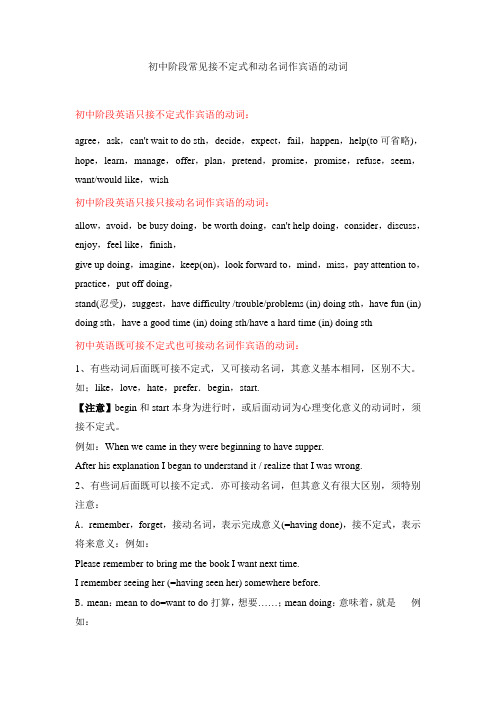既可接不定式又可接动名词作宾语的动词
非谓语动词作宾语的四种类型

非谓语动词作宾语的四种类型以下是小编为大家整理的非谓语动词作宾语的用法归纳,希望能帮助大家更好掌握这类单词,提高英语水平。
类型一:习惯上要接不定式作宾语的动词下列动词习惯上可接不定式作宾语,但不能接动名词作宾语:afford 付得起 agree 同意 apply 申请 arrange 安排ask 要求care 想要 choose 选择 decide 决定demand 要求desire 请求 determine 决心 expect 期待help 帮助hope 希望 intend 打算 manage 设法offer 主动提出 plan 计划 prepare 准备pretend 假装promise 答应refuse 拒绝 want 想要 wish 希望请看以下典型用例:She walked up to the desk and asked to see the manager. 她走到办公桌前要求见经理。
If you would care to leave your name,we’ll get in touch as soon as possible. 请留下您的名字,我们将尽快与您联系。
He applied to be transferred. 他申请调动工作。
There have been fewer problems for travelers who chose to fly. 对于选择乘飞机旅游的人来说问题更少。
After much discussion they decided to accept our offer. 经过反复讨论,他们决定接受我们开的价。
If I fail to appear by 7 o’clock, I will not be coming at all. 如果我七点钟不到,我就不会来了。
I wanted to speak to the manager but I got his secretary instead. 我想找经理说话,可是接电话的是他的秘书。
动词后接动词不定式/动名词作宾语用法小结

动词后接动词不定式/动名词作宾语用法小结动词是英语中最活跃的词性之一,其主要作用是在句中作谓语。
在谓语动词后接动词作宾语时,主要分为两种情况:Ⅰ动词加动词不定式能以不定式做宾语的动词很多,常见的有:want,hope,wonder,wish,agree,try,manager,offer,decide,fail,refuse,ask,pretend,intend,attempt,teach,discuss等。
例如:I have learned to drive the car.They refused to accept my suggestion.He promised to come.Ⅱ动词加动名词在enjoy, appreciate, admit, consider, mind, avoid., miss, can’t help, deny, practise, allow, finish, imagine, forbid, suggest等这些动词之后要求用动名词作宾语。
例如:Have you finished repairing your car?She suggested spending another week in the country.Do you feel like taking a walk.通常要后接动名词作宾语的动词英语中有些动词后接另一个动词作宾语时,通常要用不定式,不用动名词,这类动词主要admit(承认), advise(建议), allow(允许), appreciate(感激), avoid(避免), consider(考虑), delay(推迟), discuss(讨论), dislike(不喜欢), enjoy(喜爱), escape(逃脱), excuse(原谅), fancy(没想到), finish(完成), forbid(禁止), forgive(原谅), give up(放弃), imagine(想像), keep(保持), mention(提及), mind(介意), miss(没赶上), pardon(原谅), permit(允许), practise(练习), prevent(阻止), put off(推迟), report(报告), resist(忍住), risk(冒险), stop(停止), suggest(建议), understand(理解)等。
熟练既跟不定式又跟动名词作宾语的动词

• ) 1n some parts of London, missing a bus means ____ for another hour. (02春上海卷) • A. waiting B. to wait C. wait D. to be waiting
forget
• • • • • • • Don' t forget to feed the cat. 别忘了喂猫. Don't forget to send in your application. 别忘了送交你的申请书。 I forgot telling her about it. 我忘记了曾把这事告诉过她。 I forgot closing the window. 我忘了关过窗户了(关了)
• ---Let me tell you something about the journalists. • ---Don't you remember_me the story yesterday? A. told B. telling C .to tell D. to have told
regret
• sth+need doning ,是物做主语,译为 某物需要... sb+need to do , 是人做主语,译为 某人需要...
• The library needs___, but it'll have to wait until Sunday.
A. cleaning B. be cleaned C. clean D. being cleaned
• 7The baby need ___________________(look after照顾) by his mother. • 8The mother need _________________(look after) her baby. • 9Your bedroom is dirty. It needs ______________(clean清洁). • 10Your homework needs ________________(do) by yourself. • 11I want to _______________(play) basketball this afternoon.
初中英语动词后即可以接不定式又可以接动词ing形式

有些动词后接宾语时,既可接不定式,又可接动名词,但有区别。
如1. like to do “喜欢做某事”,指一次性动作。
如I like to swim in this river now.like doing “喜欢做某事”,指习惯性动作。
如I like swimming.类似的还有:dislike to do / doing (“不喜欢做某事”),hate to do / doing (“讨厌做某事”),love to do / doing (“热爱做某事”),prefer to do / doing (“更喜欢做某事”)。
2. remember to do “记得要去做某事” 如She remembered to see her parents the next day.remember doing “记得做过某事” 如I remembered meeting her yesterday.3. forget to do “忘了要去做某事” 如They always forget to have lunch when they are busy.forget doing “忘了做过某事” 如I forgot phoning Tom, so I phoned him the second time.4. try to do “试图(尽力)做某事” 如He tried to catch the early bus and he got on it at last. try doing “试图(试着)做某事” 如I tried getting on well with the new students.5. mean to do “打算做某事” 如Jack meant to help others.mean doing “意味着做某事” 如Drinking means wasting your life.6. need to do “需要做某事” (主语必须是人) 如We need to have a rest.need doing “需要做某事”(主语必须是物) 如The bike needs mending. ( = The bike needs to be mended)7. want to do “想要做某事” (主语必须是人) 如We want to have a rest.want doing “想要做某事”(主语必须是物) 如The bike wants mending. ( = The bike wants to be mended)8. begin to do与begin doing 都译作“开始做某事”,二者可以混用。
北京四中如何区别三种非谓语动词

⒈有些及物动词后面只能接动名词作宾语,不能接不定式,常见的有:finish, enjoy, admit, appreciate, avoid, mind(介意), delay, dislike, escape, excuse, miss (错过), risk, practise, understand, imagine, suggest, stand (忍受),deny, fancy, keep, get down to(着手干), put off (推迟), pay attention to, look forward to, can't help (不禁),feel likeI'm sorry I missed seeing you while in Shanghai.很遗憾,我在上海时没看到你。
He suggested discussing the problem at the class meeting.他建议在班会上讨论这个问题。
Would you mind closing the window?你介意把窗户关上吗?Will you admit having broken the window?你承不承认打破了窗户了?He avoided giving us a definite answer.他避免给我们一个肯定的回答。
I was afraid to let the boy risk climbing the tree.我不敢让这个男孩冒险爬那棵树。
I couldn't help crying when I heard the news.听到这个消息我不禁哭起来。
⒉有些动词后面既可以接动名词,也可以接不定式作宾语,其意义基本一样,如:begin, start, continue, hate, like, love, 但like, love 和would 或should 连用时,接不定式作宾语。
初中阶段常见接不定式和动名词作宾语的动词

初中阶段常见接不定式和动名词作宾语的动词初中阶段英语只接不定式作宾语的动词:agree,ask,can't wait to do sth,decide,expect,fail,happen,help(to可省略),hope,learn,manage,offer,plan,pretend,promise,promise,refuse,seem,want/would like,wish初中阶段英语只接只接动名词作宾语的动词:allow,avoid,be busy doing,be worth doing,can't help doing,consider,discuss,enjoy,feel like,finish,give up doing,imagine,keep(on),look forward to,mind,miss,pay attention to,practice,put off doing,stand(忍受),suggest,have difficulty /trouble/problems (in) doing sth,have fun (in) doing sth,have a good time (in) doing sth/have a hard time (in) doing sth初中英语既可接不定式也可接动名词作宾语的动词:1、有些动词后面既可接不定式,又可接动名词,其意义基本相同,区别不大。
如;like,love,hate,prefer.begin,start.【注意】begin和start本身为进行时,或后面动词为心理变化意义的动词时,须接不定式。
例如:When we came in they were beginning to have supper.After his explanation I began to understand it / realize that I was wrong.2、有些词后面既可以接不定式.亦可接动名词,但其意义有很大区别,须特别注意:A.remember,forget,接动名词,表示完成意义(=having done),接不定式,表示将来意义:例如:Please remember to bring me the book I want next time.I remember seeing her (=having seen her) somewhere before.B.mean:mean to do=want to do打算,想要……;mean doing:意味着,就是例如:I am sorry I didn't mean to hurt your feelings,Learning a foreign language doesn't mean just working in class.C.stop:stop to do停下来,要干另一件事,不定式作目的状语;stop doing停止干……,动名词作宾语。
不定式或动名词作动词宾语的用法
不定式或动名词作动词宾语的用法在第十单元我们学习了不定式的句法功用,可以看出,不定式和动名词都可以作主语、宾语、表语、定语和补语。
作主语和表语时,动名词形式表示一般的、概念性的、时常的动作,而动词不定式常表示一时的、偶然的行为和动作。
如:Being a doctor is a good choice.当医生是不错的选择。
(对任何人、任何时候而言都是这样的)To be a good doctor is my dream.当个好医生是我的梦想。
(对个人而言,是个别情况)用动名词还是不定式作宾语,主要分为以下四种情况:(1)只可使用动名词作宾语的动词:enjoy,miss,practice,prefer,suggest,consider,appreciate,avoid,mind,imagine,finish ,admit,deny,delay,risk等。
只跟动名词的短语:feel like,stick to,devote to,pay attention to,be worth,be busy,can’t help,it is no use,b e used to (习惯于),look forward to,can’t stand等。
(2)只可使用不定式作宾语的动词:wish,hope,promise,expect,pretend,want,agree,refuse,prepare,manage,persuade, afford,offer,attempt,decide等。
只跟不定式的习语:would like/love to等。
(3)既可接动名词,又可接不定式作宾语的动词有:start,begin,continue,like,love,hate等,意思基本没有区别。
love,like和hate接动名词和不定式时,表示长久的、规律性的好恶用动名词,表示一时的、个别性的好恶常用不定式。
如:He hate eating fish from his childhood.他从小就不喜欢吃鱼。
既可接不定式又可接动名词作宾语的动词
doing
sth.
1、表示记得做过某事,事情已做
I will remember to tell her about it. 我会记得把这件事告诉她。 Don't you remember telling me the story yesterday?
1、表示很遗憾地做某事,能这样用的 I regret to say that you have failed your exam.
1、不定式则用被动形式表示被动意义 Our house deserves to be done up.
deserve to do sth. 2、若后接动词为句子主语所发出的动 我们的房子需要修一修。
19、 deserve
作,则只能用不定式,不能用动名词
deserve doing sth.
1、动名词用主动形式表示被动意义
说是重要的。
3、物作主语时,常用不定式to do
意思基本没有太大差别,可以换用。 意思基本没有太大差别,可以换用。
第 1 页,共 4 页
既可接不定式又可接动名词作宾语的动词
6、 start start doing sth.
1、谈及一项长期活动或开始一种习惯 How old were you when you first started playing
can't help doing sth. 事
mother again.
当小女孩再次看到母亲时,她情不自禁地哭了起
来。
第 3 页,共 4 页
后面接动名词一般表示被动含义
既可接不定式又可接动名词作宾语的动词
21、
go on to do sth. go on
go on doing sth.
不定式或动名词作动词宾语的用法
不定式或动名词作动词宾语的用法在第十单元我们学习了不定式的句法功用,可以看出,不定式和动名词都可以作主语、宾语、表语、定语和补语。
作主语和表语时,动名词形式表示一般的、概念性的、时常的动作,而动词不定式常表示一时的、偶然的行为和动作。
如:Being a doctor is a good choice.当医生是不错的选择。
(对任何人、任何时候而言都是这样的)To be a good doctor is my dream.当个好医生是我的梦想。
(对个人而言,是个别情况)用动名词还是不定式作宾语,主要分为以下四种情况:(1)只可使用动名词作宾语的动词:enjoy,miss,practice,prefer,suggest,consider,appreciate,avoid,mind,imagine,finish ,admit,deny,delay,risk等。
只跟动名词的短语:feel like,stick to,devote to,pay attention to,be worth,be busy,can’t help,it is no use,be used to (习惯于),look forward to,can’t stand等。
(2)只可使用不定式作宾语的动词:wish,hope,promise,expect,pretend,want,agree,refuse,prepare,manage,persuade, afford,offer,attempt,decide等。
只跟不定式的习语:would like/love to等。
(3)既可接动名词,又可接不定式作宾语的动词有:start,begin,continue,like,love,hate等,意思基本没有区别。
love,like和hate接动名词和不定式时,表示长久的、规律性的好恶用动名词,表示一时的、个别性的好恶常用不定式。
如:He hate eating fish from his childhood.他从小就不喜欢吃鱼。
既可接不定式又可接动名词作宾语的动词
既可接不定式又可接动名词作宾语的动词It was last revised on January 2, 2021既可接不定式又可接动名词作宾语的动词一、后接不定式或动名词且含义相同的动词这类动词常见的有:like 喜欢 / love 喜欢 / hate 憎恨 / prefer 宁可/ begin 开始 / start 开始 / continue 继续/ can’t bear 不能忍受 / bother 麻烦 / intend 想要 / attempt 试图 / cease 停止,等。
如: He likes travelling [to travel] alone. 他喜欢单独旅行。
He began doing [to do] this job last year. 他去年开始做这工作。
Don’t bother to get [getting]dinner for me. 请不必费事为我做饭了。
注意:当 like, love, hate, prefer 与 would, should 连用时,其后只能接不定式。
如:I’d like to drop in and see you tonight. 我想今晚来看你。
另外,当 begin, start 本身为进行时态或后接 know, realize, understand 等静态动词时,其后的动词只能用不定式。
如:He is beginning to work in that company. 他即将开始去那个公司工作。
After the talk with his English teacher, he began to like English. 跟英语老师谈话之后,他开始喜欢英语了。
二、forget, remember, regret 后接不定式或动名词含义不同后接不定式或动名词含义不同动词 forget, remember, regret 等接不定式时,表示非谓语动词的动作发生于谓语动词的动作之后;接动名词作宾语时,表示非谓语动词的动作发生于谓语动词的动作之前。
- 1、下载文档前请自行甄别文档内容的完整性,平台不提供额外的编辑、内容补充、找答案等附加服务。
- 2、"仅部分预览"的文档,不可在线预览部分如存在完整性等问题,可反馈申请退款(可完整预览的文档不适用该条件!)。
- 3、如文档侵犯您的权益,请联系客服反馈,我们会尽快为您处理(人工客服工作时间:9:00-18:30)。
既可接不定式又可接动名词作宾语的动词
一、后接不定式或动名词且含义相同的动词
这类动词常见的有:like 喜欢 / love 喜欢 / hate 憎恨 / prefer 宁可 / b egin 开始 / start 开始 / continue 继续/ can’t bear 不能忍受 / bother 麻烦 / intend 想要 / attempt 试图 / cease 停止,等。
如:
He likes travelling [to travel] alone. 他喜欢单独旅行。
He began doing [to do] this job last year. 他去年开始做这工作。
Don’t bother to get [getting]dinner for me. 请不必费事为我做饭了。
注意:当 like, love, hate, prefer 与 would, should 连用时,其后只能接不定式。
如:
I’d like to drop in and see you tonight. 我想今晚来看你。
另外,当 begin, start 本身为进行时态或后接 know, realize, understa nd 等静态动词时,其后的动词只能用不定式。
如:
He is beginning to work in that company. 他即将开始去那个公司工作。
After the talk with his English teacher, he began to like English. 跟英语老师谈话之后,他开始喜欢英语了。
二、forget, remember, regret 后接不定式或动名词含义不同
动词 forget, remember, regret 等接不定式时,表示非谓语动词的动作发生于谓语动词的动作之后;接动名词作宾语时,表示非谓语动词的动作发生于谓语动词的动作之前。
如:
I forgot to tell you about it. 我忘记告诉你那件事了。
I remembered giving the book to Li Lei, but he said I didn’t. 我记得我把书给李蕾了,但是他说我没有给。
此外,动词 forget, remember, regret 等接动名词、接动名词的完成式或不定式的完成式作宾语时,意义相同。
如:
I regretted to have broken the rules of our class. = I regretted ha ving broken the rules of our class. 我后悔违反了班规。
三、mean后接不定式或动名词含义不同
动词 mean 接不定式作宾语时,表示一种意图,意思是“打算做,想要做”;接动名词作宾语时,表示解释,意思是“意味着,意思是”。
如:
I didn’t mean to bother you. 我本不想打扰你。
What he said means going there by air. 他的话的意思是坐飞机去那儿。
四、try后接不定式或动名词含义不同
try 接不定式作宾语时,表示一种决心,意思是“设法做,尽力做”;接动名词作宾语时,表示尝试,意思是“试着做”。
如:
I’ll try to catch up with my class. 我将尽力赶上同学们。
I tried reading the text without consulting my dictionary. 我试着不查词典来阅读课文。
五、need, require, want, deserve后接不定式或动名词语态不同
need, require, want, deserve 等表示“需要”的动词后另一动词作宾语时,该动词用不定式或动名词均可,但是其语态不同,即动名词用主动形式表示被动意义,而不定式则用被动形式表示被动意义。
如:
The flowers need watering every day. = The flowers need to be watered every day. 花儿需要每天浇水。
注意:若 need, require, want后接动词为句子主语所发出的动作,则只能用不定式,不能用动名词。
如:
I need to water the flowers every day. 我需要每天给花浇水。
六、can’t help后接不定式或动名词含义不同
can’t help 后接不定式时,意思是“不能帮忙做某事”;接动名词作宾语时,意思是“禁不住做某事,情不自禁做某事”。
如:
I’m very busy now, so I can’t help (to) clean the room. 我现在很忙,因此不能帮助打扫房间。
The girl couldn’t help crying when she saw her mother again. 当小女孩再次看到母亲时,她情不自禁地哭了起来。
说明:以下两个动词后接不定式或动名词(不一定是用作宾语)意思也不同:go on to do sth (做完某事后)继续做另一事 (不定式作状语)
go on doing 继续做一直在做的事 (动名词作状语)
stop to do sth 停下正在做的事以便去做另一事 (不定式作状语)
stop doing sth 停做正在做的事 (动名词作宾语)。
